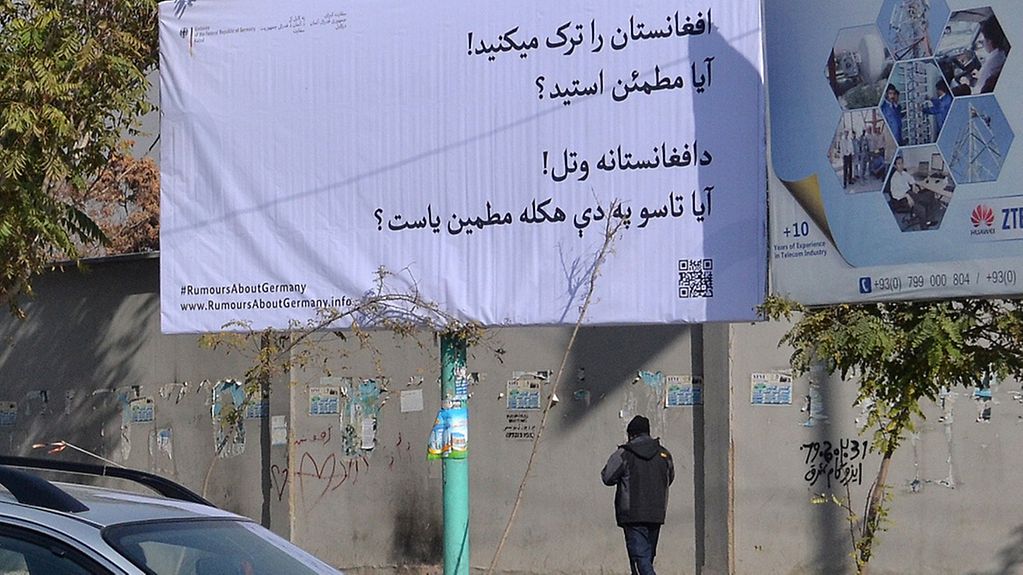Illegal migration
The goal is to inform people with no chances of being granted residence rights in Germany about the risks involved before they set off on their journey.
3 min reading time

A poster campaign in Afghanistan's capital Kabul aims to dissuade Afghans from fleeing the country. The poster reads, "You are leaving Afghanistan? Are you sure?"
Photo: picture-alliance/dpa
Federal Foreign Minister Frank-Walter Steinmeier has reported to the Cabinet on a new campaign organised by the German government with the aim of dissuading people from leaving their own country.
People fleeing war, persecution and terror are entitled to assistance in Germany. But many people in crisis-affected countries have a great many misconceptions about their chances of entering Europe and being accepted as refugees, and indeed about living conditions in Germany, Federal Foreign Minister Frank-Walter Steinmeier reported to the Cabinet.
Conveying a realistic image
The incorrect information spread by traffickers encourages many people to set off for Germany and other European countries. The German government is endeavouring to counter the rumours that abound. It is making targeted use of refugee forums and networks in an effort to convey a realistic and topical image of Germany. People are to be informed, for example, about immigration and asylum regulations. They are also warned about the economic and health risks posed by illegal migration.
"The PR work of the German government in the home countries of asylum-seekers and in transit countries is vitally important in view of the unchecked refugee movements and the dangers posed by illegal migration," stressed federal government spokesperson Steffen Seibert at the government press conference.
Campaigns launched
German Embassies and representations in the home countries of asylum-seekers in particular are actively trying to get the message across with a wide variety of information campaigns and measures. They are communicating the information to potential asylum-seekers as swiftly and comprehensively as possible, before they leave their homes, using traditional media such as television, posters and flyers, as well as the social media, including Facebook and Twitter. "Obviously we have not used the same communication strategies across the board for all countries, but have adapted them to bring them into line with the local conditions," said the federal government spokesperson.
The German Embassy in Kabul, for instance, has launched a poster campaign and is showing video clips in the local languages, Dari und Pashtu, across Afghanistan. The videos explain the risks involved in illegal migration and advise people to remain in the safe parts of Afghanistan.
"Rumours about Germany"
With its Rumours About Germany information campaign, the German government is also using Twitter and Facebook to inform young Afghan men in particular about the dangers they would expose themselves to, and about the general immigration regulations in place in Germany. At the same time, the government explains what Germany is doing in Afghanistan to support the country, and encourages the young generation to help rebuild their country.
Identifying prospects at home
In the Western Balkan states, but also in Syria, Iraq and in Africa, the information strategies concentrate on identifying prospects of a better future at home, and thus dissuading people from setting off for Europe. The German Centre in Cairo, for instance, offers daily information on the chances of remaining in neighbouring states, and involves local multipliers.
There are very different reasons that move people in Africa to leave their homes. Many states in the Maghreb and in sub-Saharan Africa are both the countries of origin of migrants and transit countries. In these states, alongside the Federal Foreign Office’s information measures, Deutsche Welle’s Africa on the Move project and the German Federal Development Ministry’s Digital Africa Initiative are being used to provide people with more information about countries of origin and target countries. The diaspora in Germany plays an important part in providing information in this context.
International cooperation
In order to address illegal migration as effectively as possible in the home countries of migrants and in transit states, the German government is cooperating with the EU, various EU partners, international aid organisations and German institutions working locally. Rumours are to be effectively dispelled with the help of a standardised common information strategy. Specific mention is also made of development projects which are helping offer people genuine prospects of a better future in their own countries.
Until further notice the refugee and asylum issue will be on the agenda of every Cabinet meeting, as provided for by the coordination concept to master the refugee situation.